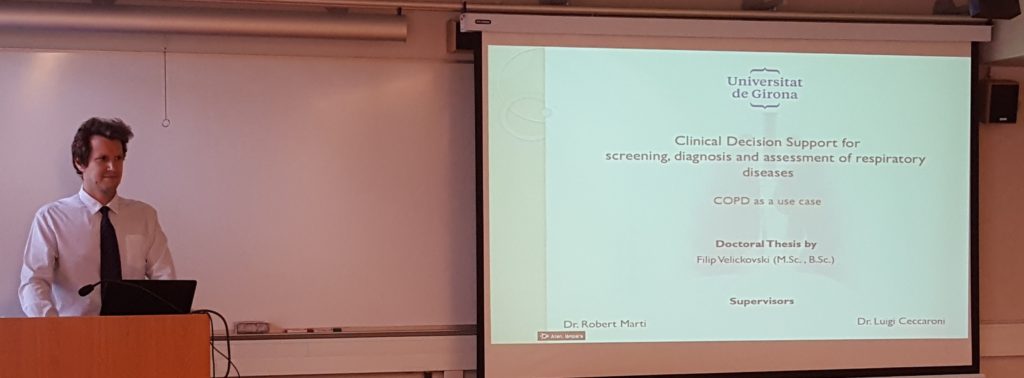Filip Velickovski presents his thesis on “clinical decision support for screening, diagnosis and assessment of respiratory diseases“, using “chronic obstructive pulmonary disease (COPD) as a use case”.
The motivation behind the thesis is related to the negative impact of COPD on human society:
– COPD is caused by inhalation of irritants – mainly tobacco smoking;
– COPD is a respiratory disease characterized by non-reversible airflow limitation;
– airflow limitation is progressive.
(Cigarette smoking is responsible for more than 480,000 deaths per year in the United States alone, including nearly 42,000 deaths resulting from secondhand smoke exposure. This is about one in five deaths, or 1,300 deaths every day. On average, smokers die 10 years earlier than nonsmokers.)
Objectives of the thesis:
- To achieve optimal clinical decision support system (CDSS) design to support healthcare providers with early-stage COPD detection
- To develop reasoning methods and algorithms for decision support tasks in COPD management
- To develop algorithms for quality assurance of spirometry
- To validate the algorithms against expert clinical professionals
Conclusions of the thesis:
- High prevalence + under-diagnosis of COPD cause a high burden in non-specialist settings
- CDSS as a complementary service to integrated care of chronic patients
- CDSS into healthcare providers work-flow
- Rule-based and data-driven methods to support screening, case-finding, and diagnosis
- Evaluations of these methods show performance near the level of clinical expert
- Credible potential to assist non-specialist healthcare providers
Summary of the contributions of the thesis:
- A CDSS framework that includes:
- Adapted incremental software development model
- Reasoning paradigm
- Suite of decision support services
- Extension to the HL7 virtual medical record (VMR) for the representation of COPD concepts allowing & enabling interoperability
- Software architecture model facilitating CDSS services to be integrated to existing health information systems (HISs)
- COPD guidelines ’ representation through rules benchmarked against clinical experts
- 28 new rules using 23 novel metrics assuring quality of spirometry by targeting 5 curve zones
- Multi-expert model of spirometry QA using ML
- Quality assurance approaches validated using three experts
Future work:
- Expand CDSS capabilities
- Personalised treatment recommendations
- Exacerbation prognosis
- Issue recommendations for specific integrated care programs
- Classification of rejected spirometry
- Evaluate CDSS for COPD in pilot trial
- Adapt the CDSS framework to other non-communicable diseases (NCDs), such as diabetes and heart disease, and to the case of co-morbid patients

